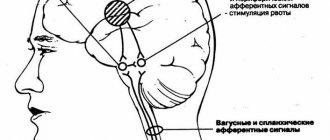The first question a woman will hear if she complains to a friend about morning sickness will most likely be related to pregnancy. Nausea during early pregnancy is such a familiar “attribute” of the expectant mother that it has become almost the main symptom of this condition, along with the notorious pickled cucumber. However, for doctors, morning sickness has a name - early toxicosis of pregnancy. “Early” toxicosis is called not because a pregnant woman feels unwell early in the morning, but because toxicosis usually begins in the first trimester and lasts until a maximum of 13-16 weeks, that is, it accompanies the early stages of pregnancy.
Anything can provoke a feeling of nausea and vomiting - a feeling of hunger, too strong a smell, eating food, a memory. Sometimes nausea occurs for no apparent reason. For a working woman, morning sickness can be extremely inconvenient and unpleasant, but it remains an unavoidable part of pregnancy. However, some expectant mothers avoid nausea during pregnancy.
How does toxicosis occur and what changes in the body lead to morning sickness?
When does toxicosis begin and end in pregnant women?
Toxicosis is a pathological condition that reflects the negative impact of pregnancy on a woman’s body.
Toxicosis develops, as a rule, as a result of disruption of the adaptive processes of the female body to bearing a fetus. The causes of toxicosis in the first trimester are hormonal imbalance, psychological changes and age criteria. Toxicosis is divided into early and late (preeclampsia). The first occurs in 50-60% of expectant mothers. Predisposing factors:
- poor nutrition and constant stress;
- bad habits;
- presence of chronic heart and kidney diseases;
- inflammatory processes in the genital organs;
- age (under 18 and over 35 years);
- history of abortion;
- asthenic constitution;
- prolonged overwork;
- unwanted pregnancy.
It is also worth noting that in women who lead a healthy lifestyle, this condition is much less common. A specialist will tell you during a consultation how to deal with severe toxicosis in the early stages of pregnancy.
What causes toxicosis?
The question of the etiology of toxicosis remains open at the moment.
Scientists continue to find new auxiliary provoking factors that can affect the development and nature of the problem. The most justified and proven theory of the progression of toxicosis during pregnancy is the formation of a “pregnancy center”, which regulates the physiological processes of the corresponding period. Against this background, the salivary, vomiting and vasomotor centers are activated, provoking the occurrence of traditional symptoms.
Factors that provoke or intensify the manifestations of toxicosis:
- Chronic diseases of the gastrointestinal tract. It has been statistically proven that most women suffering from gastritis, duodenitis or other gastrointestinal diseases tolerate toxicosis worse.
- Chronic stress. Emotional stress causes additional stimulation of the above centers with the progression of the clinical picture.
- Bad habits (smoking, alcohol abuse).
- Age of the expectant mother. Clinically, toxicosis is more severe in women under twenty and after thirty-five years of age.
- Genetic predisposition.
The occurrence of these changes is based on the active restructuring of the woman’s body to a new state of fetal development in the womb. A fertilized egg that is implanted in the uterine cavity causes a cascade of biochemical reactions. In 90% of cases, this process is accompanied by a deterioration in the woman’s condition.
When does toxicosis begin?
The timing of the onset of toxicosis in each woman is individual and depends on many factors. Most often, its onset is 9-12 days after ovulation. In any case, the process “starts” after implantation of the fertilized egg into the endometrium of the uterus.
How does toxicosis manifest itself after conception and how long does it last? The duration of this condition depends on the presence of concomitant diseases, the woman’s age, her psychological mood and other factors. On average, signs of toxicosis disappear by the end of the 13th week. If we are talking about multiple pregnancy, then the symptoms disappear by the end of the 16th week.
Types of toxicosis:
- early toxicosis (from 1 to 14 weeks of pregnancy);
- late (develops in the second half of pregnancy);
- toxicosis before delay;
- evening toxicosis.
How to relieve symptoms of toxicosis during pregnancy? In this case, homeopathic medicines, soothing teas (on the recommendation of a doctor), no-spa, and cerucal will help. In each specific case, the appointment is made after examining the woman.
Ectopic pregnancy
In an ectopic pregnancy, the fetus does not develop in the uterus, but in the cervical canal, fallopian tube, abdominal and pelvic cavities.
Normally, when an egg leaves the ovary, it enters the opening of the fallopian tube. Moving with the help of special cilia that cover the fallopian tube, after a few days the egg reaches the uterus. In normal cases, the process of fertilization of the egg occurs in the tube, then the cell appears in the uterus.
In the case of infectious obstruction of the tube or other pathology, the egg freezes in place or moves very slowly, never having time to reach the uterus. This is how an ectopic pregnancy occurs.
A blood test for hCG helps in establishing the diagnosis of ectopic pregnancy.
HCG is human chorionic gonadotropin. HCG contains alpha and beta units. Using blood tests to detect an increase in hCG levels, the presence of pregnancy can be accurately determined. So, during a normal pregnancy, the hCG level increases by 65% every two days. But with an ectopic pregnancy, this dynamics is not obvious.
In a normal pregnancy, hCG rises until the 10th week, then begins to decline. Stopping the increase in hCG levels may be a consequence of a missed or undeveloped pregnancy.
How to relieve symptoms of toxicosis during pregnancy
Nausea and vomiting are the most common symptoms of toxicosis. In addition to them, a woman may complain of increased salivation, the appearance of unusual taste preferences, changes in appetite and increased sensitivity to odors.
Nausea. In early toxicosis, it most often manifests itself in waves, in most cases being a reaction to aromatic or taste stimuli. Sometimes nausea may occur only in the evening hours. Doctors attribute this to overwork of the pregnant woman.
Vomit. Most often it bothers a woman in the morning. Its frequency depends on the severity of toxicosis and the presence of chronic stomach diseases. Not least important is the diet. Fatty and rich foods tend to aggravate the situation, causing vomiting.
You will find more information on our website Dobrobut.com. If you need specialist help, we recommend scheduling a consultation. The doctor will answer all questions (including “can toxicosis begin at 8-9 weeks”) and tell you about prevention methods.
Risk factors for early toxicosis in pregnant women
Provoking factors leading to the development of early toxicosis during pregnancy include: - chronic diseases of the digestive system, kidney disease; - stress, increased nervous excitability, depression; - hereditary predisposition; - chronic intoxication (including smoking, drinking alcohol).
Symptoms of early toxicosis in pregnant women
Symptoms of early toxicosis of pregnant women often appear at 5-6 weeks of pregnancy. Moderate nausea, intermittent vomiting in the morning, changes in food habits, and odor intolerance are not a disease if they do not lead to weight loss, weakness, or decreased performance; rather, these symptoms remind a woman of pregnancy. With any degree of early toxicosis in pregnant women, a decrease in the weight of the pregnant woman is observed; with moderate and severe degrees, blood pressure decreases, the pulse increases, drowsiness, weakness, and irritability occur. Most pregnant women with toxicosis complain of decreased appetite; even the smell of food causes a gag reflex. The most common form of early toxicosis is vomiting. Depending on the severity of the vomiting symptom, there are 3 degrees of severity of toxicosis.
First degree - mild vomiting. Vomiting occurs no more than 5 times a day, more often after eating. The general condition of the pregnant woman remains normal, and weight loss is no more than 3 kg. Laboratory tests reveal no deviations from the norm.
Second degree - moderate vomiting. Vomiting occurs up to 10 times a day (on an empty stomach or after eating), and weight loss in 2 weeks can be 3 kg. The general condition of the pregnant woman is deteriorating. The pulse rate increases, and blood pressure, on the contrary, decreases. Acetone appears in the urine.
The third step is uncontrollable, excessive vomiting. Vomiting occurs up to 25 times a day. Such vomiting causes dehydration and sudden weight loss for the pregnant woman (weight loss can reach 10 kg). Her skin becomes dry and flabby, an unpleasant odor appears from her mouth, her body temperature rises, her pulse quickens, her blood pressure decreases, and general lethargy is noted. Tests show impaired renal and liver function.
How to deal with toxicosis
At the first signs of toxicosis, you should urgently contact an obstetrician-gynecologist. A severe form of toxicosis poses a threat to the life of the pregnant woman and the fetus.
For mild vomiting during pregnancy, treatment is possible in a antenatal clinic; if the condition worsens or treatment is ineffective, hospital treatment is indicated.
In the hospital, complex therapy is carried out, which includes a therapeutic and protective regime, correction of water and electrolyte balance (intravenous administration of isotonic sodium chloride solution, glucose with drugs that normalize liver function, vitamins, drugs that suppress the excitability of the vomiting center).
To normalize the function of the central nervous system, electrosleep or electroanalgesia, endonasal electrophoresis with vitamin B1 are used. Hyperbaric oxygen therapy is used.
Complex therapy is continued until vomiting ceases, general condition normalizes, body weight gradually increases, and laboratory parameters improve. The ineffectiveness of the therapy is an indication for termination of pregnancy.
Diet for toxicosis in pregnant women
To reduce the manifestations of toxicosis, pregnant women are recommended to follow a regimen: sleep at night should be at least 9-10 hours, and it is also necessary to find time to rest during the day. It is important to provide a pregnant woman with emotional peace. It is especially useful to spend 2-3 weeks in the fresh air (at the dacha, in a sanatorium); a change of environment and regular walks reduce the manifestations of toxicosis. From the first weeks of pregnancy you should stop smoking.
A pregnant woman is recommended to adhere to a diet - eat little and often, 5-6 times a day. Food should be warm, not cold and not too hot. It is recommended to temporarily exclude spicy, sour, fried foods, as well as carbonated drinks from the diet, as this can cause nausea and vomiting. This especially applies to pregnant women with chronic diseases of the digestive system.
It is recommended to separate liquid and solid foods; it is better to drink half an hour before or an hour after meals. It's important to drink plenty to avoid dehydration, but it's best to drink small amounts often. It is advisable to snack as often as possible during the day, as an empty stomach provokes nausea. If you have an aversion to food, you need to listen to your body, since even food that is not entirely healthy, but desired, will not harm you.
You can relieve nausea in the morning by sucking on a rye cracker, and only then slowly get out of bed. During the day, drink mineral water, water with lemon, and weak green tea in small sips. Herbal medicine is indicated for early toxicosis in pregnant women, especially with mild manifestations of the disease. The most effective for toxicosis are infusions of chamomile, mint and lemon balm. 2 tablespoons of pharmaceutical chamomile are poured with boiling water (about half a liter) and left overnight in a thermos. In the morning, filter and take 3 times a day 30 minutes before meals. Melissa and mint are brewed and used in the same way. You can add a spoonful of honey and lemon to the infusion. In the summer, when you have fresh mint or lemon balm, you can carry a few leaves with you and chew them to relieve nausea. It is useful to add ginger to tea. Prevention of early toxicosis in pregnant women Prevention of toxicosis should be carried out before pregnancy, it includes: - timely treatment of chronic diseases that provoke toxicosis; - healthy lifestyle; - psychophysical preparation for the upcoming pregnancy.
When a doctor's help is needed
Most pregnant women are diagnosed with a mild form of toxicosis, the characteristic manifestations of which are nausea and vomiting in the morning. However, there are a number of symptoms that require immediate assistance from a specialist.
When to worry:
- general weight loss;
- severe dry skin;
- vomiting more than 7 times a day;
- yellowness of the sclera and mucous membranes;
- decreased urine output;
- severe asthenia;
- changes in consciousness (increased drowsiness, lethargy);
After examining the woman, the doctor will prescribe an additional examination, based on the results of which a course of therapy will be recommended. In addition, the specialist will advise how to cope with toxicosis in the evening and what will improve the general condition of the pregnant woman.
Strategies to prevent nausea
- Keep plain crackers, crispbread, rice cakes, or even a piece of chocolate by your bed and eat something as soon as you wake up to raise your blood sugar before you get up.
- Instead of three large meals a day, eat five to six small meals to keep your stomach full and your blood sugar levels stable.
- Include enough protein (meat, fish, eggs, cheese) and complex carbohydrates (fruits, vegetables, grains) to meet the needs of your developing baby.
- In addition to taking your regular prenatal vitamins, some nutrition experts recommend taking 50 to 100 mg of vitamin B6 as a supplement to help prevent nausea.
- Stay away from spicy or fatty foods, avoid overheating and sweating, and get plenty of rest.
Diagnosis and what helps in the treatment of toxicosis
As part of the examination, the woman will be prescribed a general blood and urine test, blood biochemistry, ECG, ultrasound examination of the pelvic organs, ultrasound of the kidneys and pancreas. In some cases, consultation with a neurologist, gastroenterologist and endocrinologist may be required.
In case of complicated toxicosis, it is extremely important for a pregnant woman to monitor blood pressure and notify the doctor of any changes. Women with a sudden weakening of the main symptoms of pregnancy require special attention.
During the consultation, the doctor will tell you how to get rid of signs of toxicosis during the day and what is better to use - medications or traditional medicine recipes.
Premature birth
Preterm labor is the onset of labor before 37 weeks. Premature birth can occur suddenly or follow an existing threat of miscarriage.
The process can begin with uterine hypertonicity, isolated contractions and moderate abdominal pain. Another scenario is rupture of the membranes and rupture of amniotic fluid. Sometimes premature labor can begin with bleeding. This happens with placenta previa or placenta abruption.
In any case, urgent hospitalization of the pregnant woman is necessary, in which all necessary measures will be taken to maintain the pregnancy.
In case of critical placental abruption and rupture of the amniotic sac, emergency delivery may be performed.
Treatment of toxicosis
What helps in the treatment of toxicosis? The gynecologist at the antenatal clinic hears this question every day. And really, how can you help a woman? Doctors say that regular adherence to the recommendations below will reduce the manifestations of toxicosis and improve the general condition of the expectant mother.
Expert recommendations:
- following a diet with a predominance of vegetables and fruits;
- taking sedatives and multivitamins;
- daily walks;
- physiotherapy;
- calm home environment;
- aromatherapy;
- healthy lifestyle.
Complications and prevention
Complications of toxicosis include gestosis and multiple organ failure. Late toxicosis (preeclampsia) is dangerous due to placental abruption.
Good prevention would be a healthy lifestyle, timely treatment of inflammatory diseases, psychological balance, moderate physical activity and strict adherence to doctor’s recommendations. Let us remind you that there is no clear answer to the question “when does toxicosis begin and end in pregnant women”. Everything is individual and depends on many factors.
If you have any questions, please contact our center specialists. You can make an appointment directly on the website. The doctor will answer your questions, including “at what week does toxicosis go away” and recommend additional examination methods if necessary.
Related services: Ultrasound examination Consultation with an obstetrician-gynecologist during pregnancy










